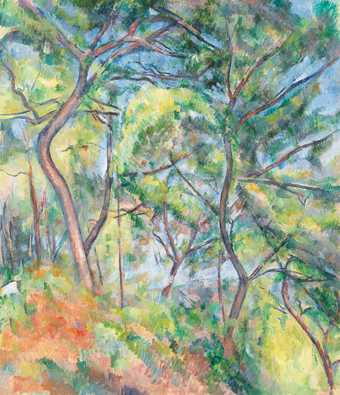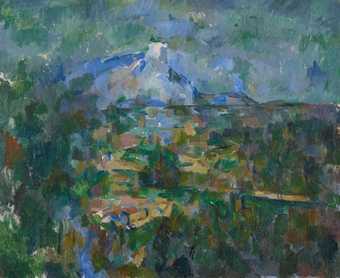
Paul Cezanne
Forest Floor (Sous-Bois) c.1894
Oil paint on canvas
116.2 × 81.3 cm
Los Angeles County Museum of Art, Wallis Foundation Fund in memory of Hal B. Wallis. Photo © Museum Associates/LACMA
Listen to this article
In Cezanne’s paintings there seems to be an exchange between two different realities: one that deals with the materiality of the painting, and another that deals with the world that is being observed but never quite conquered. I have always been intrigued by the way that Cezanne uses colour and sharp contrasts to bring a physicality, or concrete reality, to his paintings. He abandons the idea of the canvas as a window onto a world – of depicting a real place – and instead comes to terms with the two-dimensional nature of painting. Cezanne has always worked in the direction of the gesture – his brushstrokes, excessive paint, transparency, lightness and sharp contrasts do not necessarily portray something that exists.

Paul Cezanne
Mont Sainte-Victoire Seen from Les Lauves 1904–6
Oil paint on canvas
59.9 × 72.2 cm
Kunstmuseum Basel. Photo: Martin P. Bühler
What intrigues me most is this non-existent place that Cezanne tries and fails to grasp, because he knows it’s impossible to translate the power of nature. In my own work, I think of my landscapes as mirages, as a search for an unreachable place and idea; they are never something concrete. In these unreal places, our works cross paths.
Cezanne painted Mont Sainte-Victoire countless times, and each time, he approached the depiction of his subject matter as much as an exercise as a mistake. He knew he would not be able to come to terms with it; he accepted the failure.
I am stuck on my themes too. I try to translate something, or to unveil a subject, until exhaustion; until I can catch a glimpse of it, before it suddenly vanishes. This insistent exercise of reiteration is what leads me to new ways of seeing and understanding in my work. In Cezanne’s paintings of Mont Sainte-Victoire, he seems to be pursuing this same illusory goal.
Lucas Arruda is an artist who lives and works in São Paulo, Brazil.
Audio narration by Wesley Nzinga.
